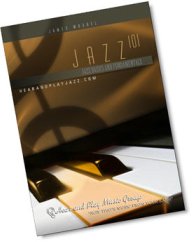Diatonic Triads
Diatonic Triads - chord symbol and
roman numeral analysis
Starting with a C major scale:

we are going to build a triad on each note of the scale:

These are the diatonic triads in the key of C major. They only use notes in the key signature with no added sharps or flats.
Here are the same diatonic triads in the key of C major in the 1st inversion:

Here are the same diatonic triads in the key of C major in the 2nd inversion:

The chord symbols above the staff describe each chord... i.e.
- the C, F and G chords are major
- the D, E and A chords are minor and
- the B chord is diminished
Below the staff there is a series of Roman Numerals. It traditional music theory, diatonic chords and chord progressions are analyzed with Roman Numerals.
- the upper case,(I-IV-V) are major chords
- the lower case (ii-iii-vi) are minor
- the lower case with the little circle (vii°) is diminished.
CHORD SYMBOLS are widely used in popular and jazz sheet music. Understanding them is a must for any chord player.
Although the ROMAN NUMERALS are not used today in most sheet music, they are EXTREMELY IMPORTANT in understanding and using SUBSTITUTE CHORDS and CHORD PROGRESSIONS.
Below are listed the DIATONIC TRIADS in all of the major keys.



Click here to GO BACK TO CHORDS & TRIADS
7th chords - chord inversions - sus chords
extended chords - diatonic triads - diatonic 7th chords
primary chords - secondary chords - secondary dominants
THE COMPLETE
ONLINE BUSINESS BUILDER
SBI
Hi and Welcome!
Fill out the form below to sign up for the free periodic
Player's Guide Newsletter!
Get tips and ideas about substitute chords, chord progressions and harmonic movement.
Harmony and Theory:
by Carl Schroeder and Keith Wyatt
The Complete book of:
Scales, Chords,
Arpeggios & Cadences






